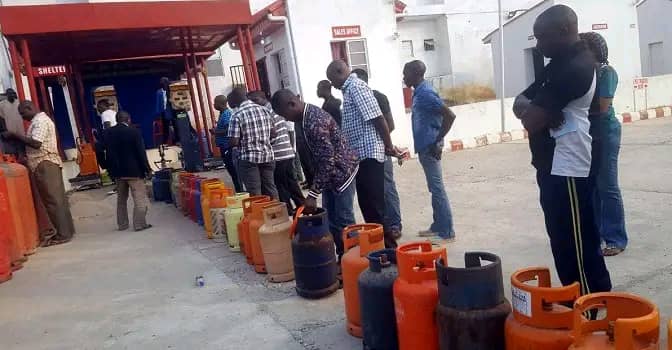The Nigerian National Petroleum Company Limited (NNPC) has attributed the recent increments in cooking-gas (LPG) prices, while linking scarcity in some parts of the country to distribution disruptions caused by a sudden industrial action by the Petroleum and Natural Gas Senior Staff Association of Nigeria (PENGASSAN).
The NNPC alleged that the strike stemmed from the dismissal of the Union’s member–workers at the Dangote Refinery, which temporarily crippled loading and supply operations.
Speaking with State House correspondents, following a meeting with President Bola Ahmed Tinubu, the NNPC Chief Executive Officer, Bayo Ojulari, termed the surge in the price as “relatively artificial,” pointing to how disruption of the association’s activities has drastically influenced the distribution output. “As things return back to normal, it takes some time for distribution to be fully restored,” he said.
Therefore, he faulted retailers and marketers for using the opportunity to exploit the shortfall by hiking their margins.
“With that delay, some of the people who had existing resources and reserves had to put up the price,” he added, assuring Nigerians that once the supply chain stabilises, cooking gas prices will also be balanced.
Background
Recall that the strike action was launched over alleged wrongful dismissals of some workers at the Dangote Refinery, and which was later suspended on 1st October, after a successful intervention from the Federal Government of Nigeria.
Meanwhile, the industrial resistance has been taking tolls on Nigerians, especially with the direct implication of throwing the country into the nightmare of exorbitant rates of gas. Reports showed that Nigeria’s daily oil output shrank by 16–percent during the strike period—an estimated loss of about 283,000 barrels per day—while gas supply declined by roughly 1.7 billion standard cubic feet daily.
Key plants, such as the Oben gas facility, also saw shutdowns or reduced throughputs, and some cargo loadings at export terminals were delayed.
Households Under Strain
Consumers are now feeling the brunt of the strike on the surface. In Lagos, the prices of cooking gas have surged from ₦1,700 to ₦2,300 per kilogram in many areas, with long queues at filling stations posing a great challenge to the people who depend on using gas for cooking.
A report by the Guardian Nigeria revealed that retailers are pushing as high as N3,000 per kilogram in some localities, with market observers noting that the scarcity is most acute in the South-West, while supply in the South-South and parts of the East remains relatively more stable.
The report further indicated that refilling a 5–kilograms of cylinder in Lagos, and Ogun states now commands prices between ₦1,800 and ₦3,500 per kg, with filling stations offering “slightly lower” rates but a long waiting period on the queue.
The recent developments are not unique. It forms part of recent price surges against a long–term trend. The National Bureau of Statistics (NBS) earlier reported that the price of a 12.5 kg cooking gas cylinder skyrocketed from approximately ₦14,261.57 in July 2024 to ₦20,609.48 in July 2025, representing a year-on-year increment of 44.51–percent.

